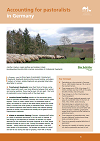Günther Czerkus, Evelyn Mathias and Andreas Schenk / League for Pastoral Peoples and Endogenous Livestock Development / 2020
Pastoralists are a tiny minority in Germany. The around 2,800 herders make up 1% or less of the country’s farmers. They manage up to 70% of the sheep (1.2 million animals), less than 0.5% of the cattle (55,000 animals), and some goats. They manage also 4.2% of Germany’s permanent grassland.
The 1,000 largest shepherds generate a net value of around €93 million in the form of meat, milk, cheese, wool and dung. While Germany has a wealth of agricultural statistics, specific data on pastoralists are hard to find. The figures given in this paper are estimates.
There is no generally accepted definition of pastoralists in Germany. Three broad categories exist:
- Transhumant shepherds move their flocks of sheep, sometimes mixed with goats, over long distances between their winter and summer pastures; these may be over 200 km apart. This form of pastoralism occurs mainly south of the River Main.
- Location-bound herding prevails on the permanent grasslands of northern and eastern Germany, but is also found in other regions. Flocks of sheep, mixed flocks, or sometimes herds of goats, are herded in a more or less wide radius around the homestead; in winter they often graze on harvested fields.
- Alpine or mountain farming occurs in the far south of Bavaria. In late spring or the beginning of summer, animals are driven together up to alpine pastures, where they stay during the summer. They are brought down again in the autumn. Despite their small numbers, pastoralists play an outsized role in maintaining landscapes and the ecology in Germany. Their environmental services are worth €260–435 million per year. In addition, grazed landscapes attract tourists and offer habitats for pollinating insects.

Download document
